The year of the women The year of the women










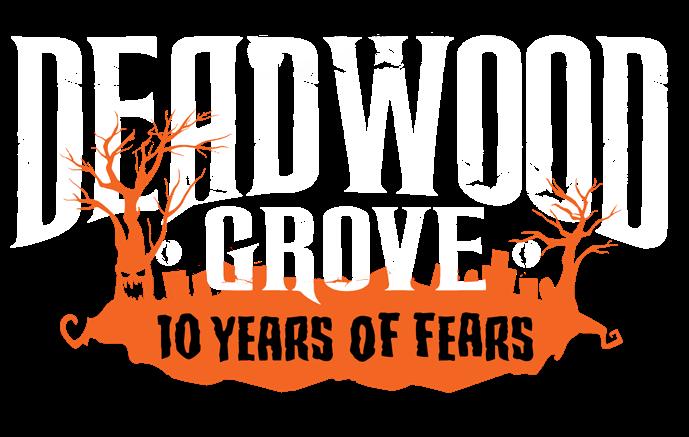
The
Hear
No person in the United States shall, on the basis of sex, be excluded from participation in, be denied the benefits of, or be subject ed to discrimination under any education program or activity receiving federal financial assistance[.]
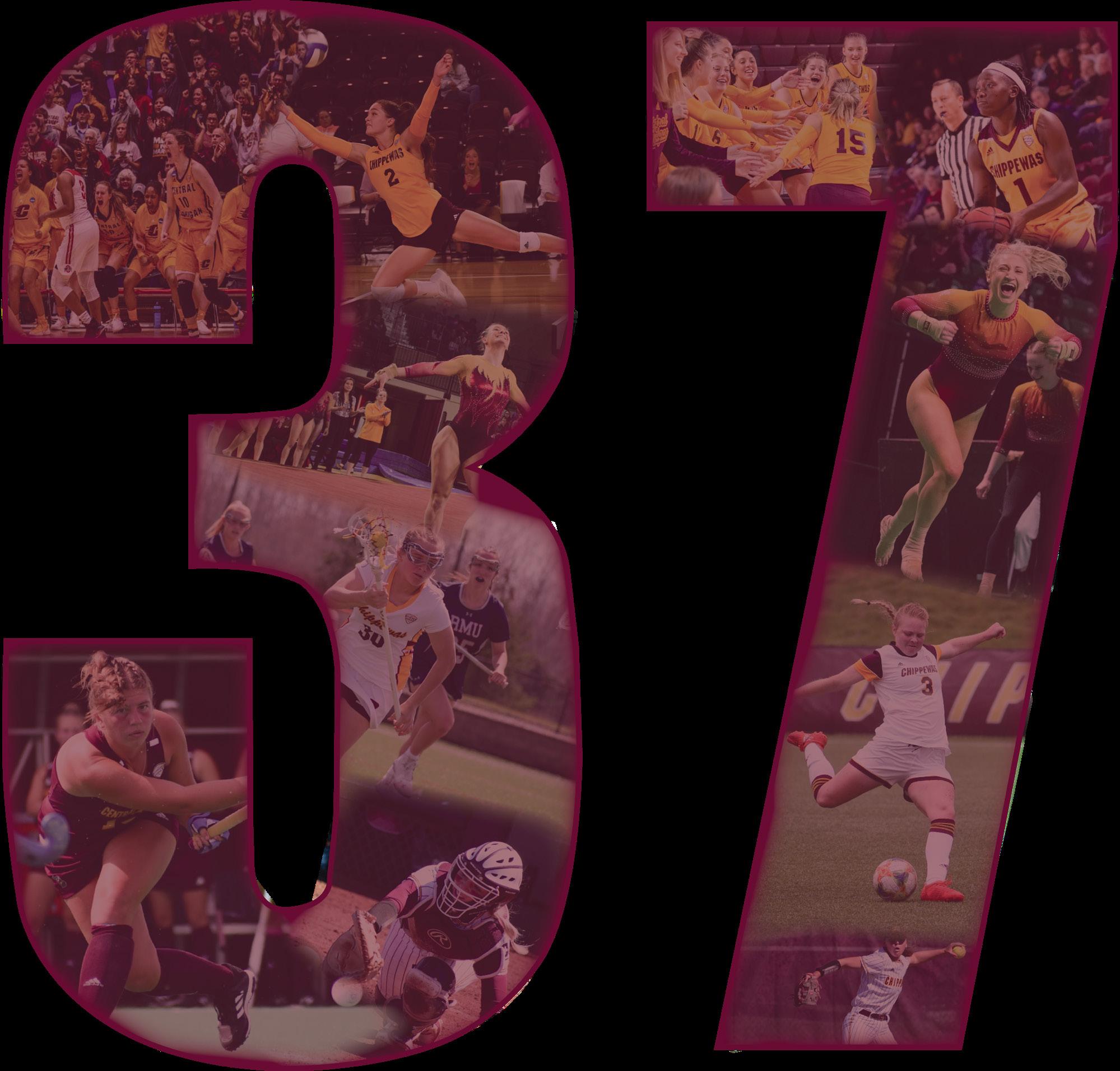 By Ashley Birkeness Staff Reporter
By Ashley Birkeness Staff Reporter
For the first time in Central Mich igan University history, six grand marshals were honored during CMU’s 2022 homecoming parade.
CMU didn’t just recognize multi ple grand marshals, but six female coaches who have made a tremen dous impact on CMU athletics.
Marcy Weston, Sue Guevara, Cristy Freese, Margo Jonker and the
late Fran Koenig and Mary Bottaro were celebrated for their impact on CMU women’s athletics on Oct. 8 during the homecoming game.
CMU held its first Homecoming on Saturday, Nov. 22, 1924, accord ing to the university website. The celebration began on Friday with a pep rally and a bonfire followed by a dance. The next morning the American Legion decorated the town with flags, and a parade of approximately 100 cars drove down Main Street. That afternoon
the football team defeated Alma College 13-0.
Grand marshals are selected to recognize service and support to the university and community. The grand marshals return to campus to be honorary leaders of home coming, preside over the parade, participate in halftime ceremonies and serve as ambassadors through out the weekend.
“Dr. Elizabeth Brockman (an English faculty member at the uni versity) was the chair of the Title IX
Diversity Committee and because it is the anniversary of Title IX, I think she suggested that the six of us be the grand marshals because we are all women,” Guevara said, “It’s the year of the women.”
Without the contributions of Koenig and Bottaro, the year of the women may not be possible.
“Fran and Mary were close friends of mine and to have them be grand marshals — it just kind of completes the whole weekend,” Weston said.
Sue Guevara, who was inducted into the CMU Marcy Weston Athletics Hall of Fame in 2020, has no doubt made an impression on the collegiate basketball world.
Guevara, a native of Saginaw, attended Saginaw Saint Stephens High School. She earned a bachelor’s degree in physical education from Saginaw Valley State in 1982 and her master’s degree in athletic administration from Ohio State in 1985.
Before making her way to CMU, Guevara spent time as a graduate assistant at Ohio State and was an assistant coach at Auburn, Ball State and Michigan State universities. In 1995, she was named associate head coach at MSU.
In 1999, Guevara was named head coach at the University of Michigan, where she spent seven seasons. She led the Wolverines to five postseason appearances, including three NCAA tournament berths.
Guevara was named head coach of the Chippewa program in April of 2007. She spent 12 seasons with the CMU women’s basketball team, leading it to three NCAA tournament appearances.
“(The players) knew how much I cared about them,” Guevara said. “And
how my only mission, the mission of our program, wasn’t to win champi onships — that can be our goal, but the mission was to help these young women become successful, confident women. (So) ... when they graduate, they are going to go out into whatever community they’re in, and they’re going to be self-sufficient. That’s what it has always been about.”
In 2017-18, Guevara led CMU to NCAA Tournament wins over No. 24 Louisiana State University and No. 10 Ohio State en route to a berth in the Sweet 16.
“I know that they enjoyed them selves here, even when they didn’t like me, and I didn’t like them,” Guevara said. “And that wasn’t very often. But there was loyalty here. A loyalty and a love.”
In her last season (2018-19), Guevara led the Chippewas to their third-consecutive Mid-American Con ference regular-season championship and second-straight NCAA Tourna ment bid.
“It’s always been about Central Michigan, this women’s basketball program and all the people that contributed to the success of our program,” Guevara said. “I’ve been so grateful to have the assistant coaches
that I had, to have the administration I had, from the president down.”
Guevara was then named the Kay Yow National Coach of the Year and earned her second MAC Coach of the Year Award.
“That was a surprise,” Guevara said. “But I don’t do it all by myself, I have help and it takes a village, and I just happen to be the mayor of the village.”
Guevara guided five players to the professional level, including Reyna Frost, Presley Hudson, Tinara Moore, Cassie Breen and Micaela “Twin” Kelly. Hudson and Kelly have now re turned to the CMU basketball program to be a part of the coaching staff under Guevara’s former player, Heather Oesterle.
“There are so many kids, young players I could talk about what they are doing,” Guevara said. “And it makes my heart happy to know that they are doing what they love, and they are successful at it.”
Multiple Halls of Fame, a decade of MAC championships and gold medals are just a few of the achievements of Margo Jonker.
Jonker earned her bachelor’s degree in physical education from Grand Valley State in 1976. A year later, she began coaching at GVSU while also serving as the softball coach at West Ottawa High School.
When arriving at CMU in 1979, Jonker served as a graduate assistant volleyball coach under Weston, in addition to her softball duties.

After spending one year as an assis tant on the softball coaching staff, she took the reins of the softball team and became the head coach. She went on to lead the Chippewas for 40 years.
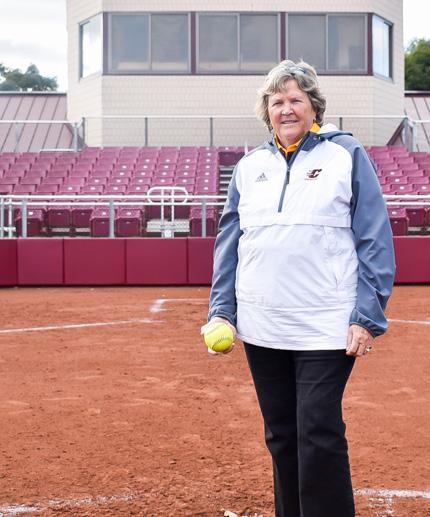
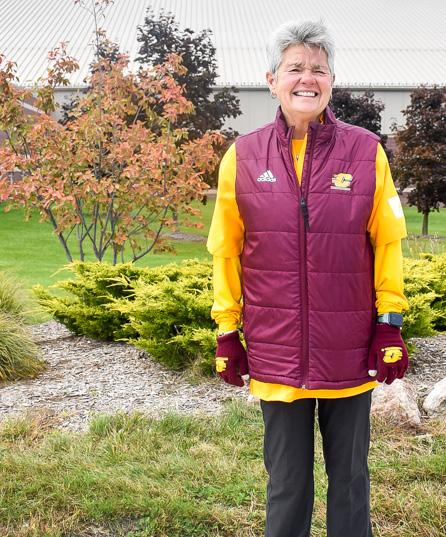
In 1981, the Association for Intercol legiate Athletics for Women (AIAW) merged with the NCAA and drastically changed the percentage of women coaches and administrators in college sports.
“That was tough,” Jonker said. “Be cause AIAW, I was all in, because they started women’s sports and the NCAA didn’t want women’s sports, but (the NCAA) took over now because (wom en’s sports) are making some money. So it was frustrating to me.”
Jonker is one of the most decorated coaches in the NCAA softball world.
She led the Chippewas to 10 MAC tournament championships, 10 MAC regular season titles, 13 NCAA tourna ment appearances and a berth each in the Women’s College World Series and the AIAW National Championship.
In 1982, Jonker’s third season as head coach, the Chippewas won a program-record of 51 games and captured their first MAC title. The squad advanced to the AIAW National Championships in Oklahoma City, where CMU finished fourth with a 4-2 record.
In 1987, Jonker led CMU to a MAC Championship, the Mideast Regional Championships and a fifth-place finish at the College World Series.
“I look back and think ‘how did this ever happen?’ because I grew up on a small dairy farm in Holland, Mich igan,” Jonker said. “I feel like God’s been so good to me, and put the right people in front of me to be my mentors and to lead me in the right direction.”
In the mid-to-late ’90s, CMU set a program record of four consecutive NCAA Tournament appearances.
Alongside her success in the CMU softball program, Jonker served as an assistant coach for the U.S. Olympic softball team that went on to win the gold medal in the 2000 games in Syd ney, Australia.
“You get to be around the best in the sport that you love so it was an amaz ing experience,” Jonker said. “Going to the Olympics and hearing them announce that, ‘this is the Olympic Games’ in only the voice the Olympics have, and then walking across the field to the first-base coaching box because I was the assistant was just like, goose bump city. ”
In 2004, the Chippewas started the season by knocking off No. 5 Oklaho ma, 3-2; and No. 4 Washington, 1-0. CMU then went on to win the MAC regular-season title.
Jonker, with an overall record of 1,246-780-6 at CMU, was honored during the 2008 season, as the Chip pewas softball facility was renamed Margo Jonker Stadium.
“I have felt more at home on the softball field than any place in the world, so nothing is strange about being in the softball world and being in that third-base coaching box,” Jonker said. “That is who I am. That’s who I was. But I have always said, ‘coaching is ... not something I do. It’s who I am.’”
On April 22, 2010, the Chippewas defeated Michigan State, 5-1, to give Jonker her 1,000th career victory — making her the 11th Division I coach at the time to reach that milestone.
A required physical education class set then-college freshman Marcy Weston on the path of a coaching ca reer that would make a major impact on CMU women’s athletics.
Since 1972, Weston has been a major influence on intercollegiate athletics here.
Weston graduated from the University of Dayton with a Bachelor of Science degree and received her Master of Education from Kent State. After earning her master’s degree, Weston took a job at the University of Wisconsin-Whitewater, where she coached field hockey, softball, was an assistant basketball coach and taught six classes.
After three years, a restriction in the physical education department led to Weston being laid off and in search of a new job. Her brother, who was an undergrad at Western Michigan Uni versity, sent her a placement notice about a field hockey job at CMU.
Weston applied for the head field hockey coaching position in 1972 and found it came with a teaching position. She was offered the job a week later.
Weston talked about her experi ences in a 2016 interview with Frank Boles. CM Life obtained a transcript of the interview from Bryan Whitledge at the Clarke Historical Library.
“So, I loved it here,’’ Weston said in the interview. “I mean, I loved it. I coached for 17 years, and I was the only coach that didn’t want to go to a 12-month contract, because I liked having a 10-month contract. I made less money, but I could golf in the summer, listen to the Tigers or go to Tiger games.”
After two years as the field hockey head coach, Weston found herself on the verge of not having a job again; her predecessor was returning to the
program. Determined to fight for her job, Weston took her contract to the dean at the time and preached that she was full-time, regular faculty.
When he didn’t agree, Weston made the decision to take the issue to the union. She was told she would be viewed as a troublemaker, but purportedly fired back.
“I’m not a troublemaker,” Weston said in the interview. “This is not right.”
She took a position as the volley ball coach; months later Weston was named the women’s basketball head coach as well.
“My favorite was probably volley ball, and that was my worst sport as an athlete but it was my favorite to coach,’’ Weston said. “A lot of the vol leyball players back then also played basketball because there were multisport athletes. ... I would coach them in volleyball then I would coach them in basketball, and so those athletes are the most I am connected to. I was probably part of them for two-thirds of every year they were in college.
“I don’t have any children, so my athletes were like my daughters,” she concluded.
Weston posted a 419-143-15 record in 15 years with the volleyball program, while coaching three Mid-American Conference Players of the Year, 20 All-MAC student-athletes and seven academic All-MAC honorees.
In 1981, Weston set the CMU volleyball single-season record for wins with 54, including a 13-game win streak. That led to the best winning percentage of .864 with a record of 38-6 in 1982.
Aside from coaching, Weston found a passion for refereeing due to a required officiating class during her undergrad years.
Just behind the football stadium sits Cristy Freese Field, named for the woman who led the CMU field hockey pro gram into the modern age.
Before coming to CMU, Freese was a four-year letter winner in field hockey and a captain her senior year for the Buckeyes, while earning a bachelor’s in education. She earned her master’s degree in physical education from James Madison University.
While playing at OSU, Freese faced off with CMU in the regional tournament.
“So because of that connection, and what Mary (Bottaro) was able to do, and the way she was able to elevate the pro gram here at CMU, when ... she was retiring,” Freese said, “I knew they had a very good field hockey program. And I knew I wanted to be a part of that.”

Freese led the Chippewas to four MAC championships,
According to her profile on the CMU Hall of Fame website, Weston was the National Coordinator for the NCAA Women’s Basketball, officiat ing from 1986 to 2005. She officiated the 1982 and 1984 NCAA Women’s Basketball championship games.
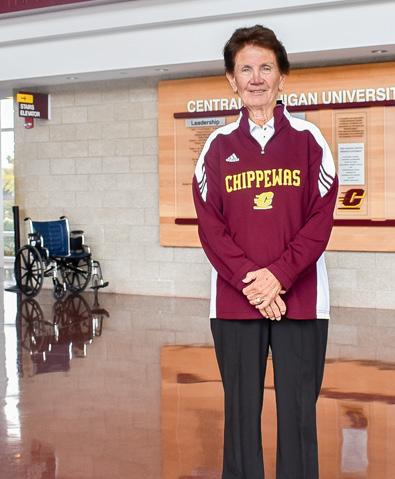
“I liked to feel I kind of had some influence because I was the national coordinator of officials for the NCAA for years,’’ Weston said. “So I got to help with those processes and work for the betterment of officials in gener al, but certainly for women’s basket ball officials.”
The NCAA recognized Weston in 1991 as one of nine major contributors to the first decade of NCAA women’s basketball. Weston was inducted into the Women’s Basketball Hall of Fame in 2000.
The National Association of Sport Officials honored Weston in 2008 as the first female to earn the Gold Whistle Award.
After coaching and officiating, Weston took advice from her mentor, Koenig, who suggested that she go into administration. She served as senior associate athletics director from 1989 until 2011.
“When I went into administration I didn’t sit in my office, I was always out and about,” Weston said. “I’d get in about 7:15 in the morning and I’d make my rounds with the men’s and women’s coaches. I’m a talker, I am a people-person, and I thought I needed to develop relationships with all of our coaches because athletics is about coaches ... impacting the lives of their athletes.”
Weston oversaw five sports, including volleyball, soccer, field hockey, gym nastics and women’s basketball as the executive associate director of athletics and a sports administrator at CMU.
and she earned the MAC Coach of the Year award four times.
More than 100 of her players earned All-MAC honors during her 29 years as the field hockey coach.
“I wanted my student athletes to be good students,” Fre ese said. “I mean, you can ask any one of them, I recruited them because you’re going to come and you’re going to get a degree here.”
She currently holds a record of 219-315-6 as the field hockey coach.
“I never did it to have a field named after me,” Freese said. “And you always preach it’s about everybody, but again since then, I do feel that my legacy here is attached to that and I’m proud of my time here.”
Before retiring in June of 2019, Freese received the MAC Diversity and Inclusion Administrator award for her work in the league’s diversity and inclusion initiative.
Mary Bottaro, who died in 2020, left her mark on the CMU history books over 10 years as a record-setting coach.
Bottaro, from the Detroit enclave of Highland Park, earned a bachelor’s degree in 1951 and a master’s degree in 1957 from Wayne State University. She earned All-American honors as a field hockey player in col lege and gained recognition as a basketball official, an international field hockey umpire and for refereeing two World Cup Field Hock ey tournaments.
In 1976, Bottaro was brought to CMU as an
assistant professor in the physical education depart ment as well as the field hockey coach. She led the CMU field hockey team to three state championships, three regional titles and three na tional tournament appear ances in the 1970s and ’80s. The 1976 field hockey team was inducted into the CMU Athletics Hall of Fame in 2011 with a 20-1-1 record. Bottaro is a member of the Mid-American Conference Hall of Fame. CMU honored Bottaro and her success as a coach by inducting her into the CMU Hall of Fame in 2002.
Fran Koenig was a leader, mentor, friend and an inspiration to many, as she sparked the development of women’s athletics at CMU before retiring in 1989.

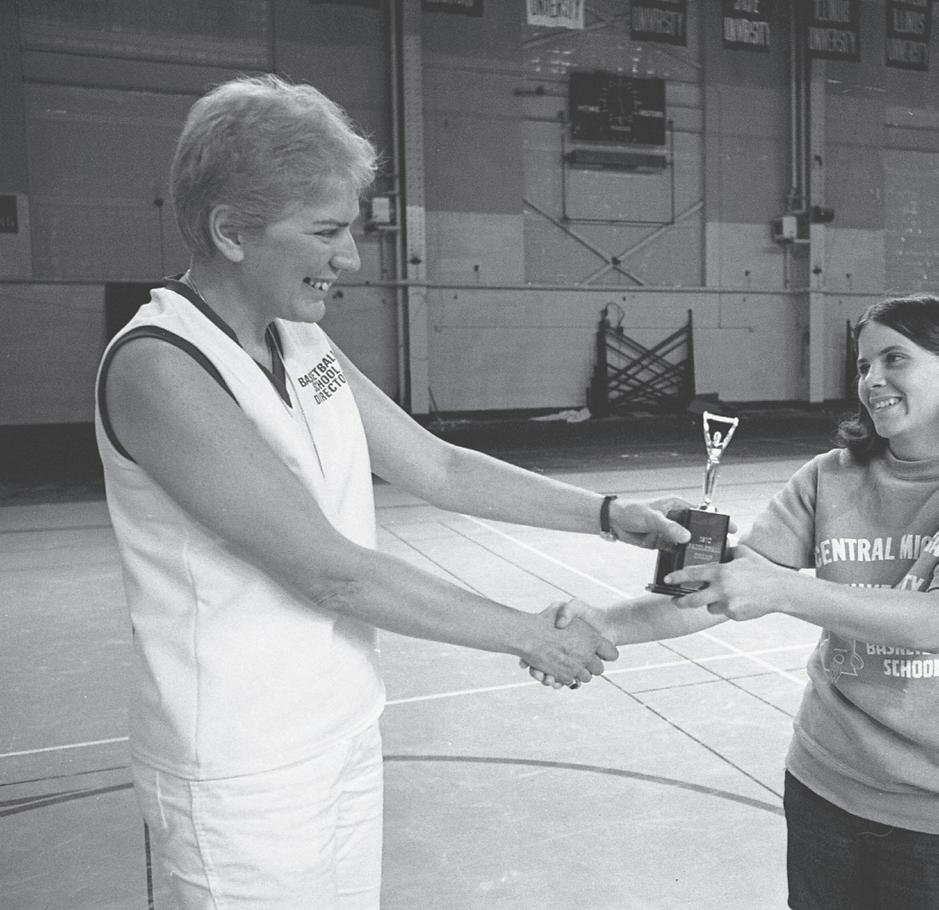
Koenig, who died in 2000, graduated from Brown University in 1950 then went on to achieve her master’s degree from Smith University. She received her doctorate from Michigan State University in 1969, according to her biography in the Concord Univeristy Chicago Athletics Hall of Fame.
Koenig’s coaching career spanned 37 years at four different schools. From 1952 to 1959, she coached every women’s sport at Morrisville Central School. She was an assistant professor at Concordia Teachers College while also coaching women’s basketball, field hockey, ten nis and volleyball from 1959 to 1964. She also coached field hockey from 1964 to 1968 at Michigan State University while working on her doctorate.
Koenig served as the national chair of the ethics and eligibility committee of the Association of Intercol legiate Athletics for Women, which was then the equiva
Imagine a world without Serena, Venus Williams, Lindsey Vonn, Sue Bird or Simone Biles. The landscape of sports would look vastly different.
However, thanks to 37 words tacked onto a bill in 1972, a world without women’s sports isn’t a reality.
“No person in the United States shall, on the basis of sex, be excluded from participation in, be denied the benefits of, or be subjected to discrimination under any education program or activity receiving Federal finan cial assistance.”
lent the NCAA.
She was on 21 Association for Intercollegiate Athletics for Women committees and had a part in CMU hosting the 1977 AIAW gymnastics finals and the 1980 Division I Final Four basketball tournament.
Koenig was inducted into the CMU Athletics Hall of Fame in 1995 as a coach and administrator.
Outside of Koenig’s career, she made an impact on many lives, including the 2022 grand marshals. Koenig had a big impact on Weston’s career and personal life.
“Fran hired me,” Weston said. “She told me what to do and I did it. Fran was like my surrogate mom up here; I mean if I had a problem I’d go talk to Fran. She was just my mentor and my friend.
“You can tell mentors good and bad things and they have your back. And I think that was the most important part. Even when I said ‘I don’t really want to do this,’ she would encourage me and then tell me ‘Yes you do, and these are the reasons why’ and she was never wrong. So I tried to give that back to my athletes.”
On June 23, 1972, those 37 words were signed into law by then-President Richard Nixon. Title IX prohib ited the discrimination of sex in educational programs receiving federal financial assistance. It is sometimes referred to as the “The Pursuit of Equal Play” because of the impact it has had on athletics.

Title IX requires institutions receiving government funding to provide equal opportunities in academics and athletics to all.
“Title IX protects everyone,” said Mary Ann Martinez, executive director of Civil Rights & Institutional Equity at Central Michigan University. “It creates equal oppor tunities. Providing equal access to women in sports and scholarships increases the diversity of student athletes.”
Title IX increased the participation of girls in athletics because there was now a law that provided the opportu nity for women to play sports at all levels.
One such woman was former Central Michigan field hockey head coach Cristy Freese.
“For me to get into organized athletics was really exciting,” Freese said. “But again, I wasn’t able to do that until I was a freshman in high school. Whereas nowadays, you know, that’s happening for young girls, as it did young boys.”
By removing barriers for women, Title IX made it easier for women to not only be involved in sports, but thrive in them, and make a career out of them.
“It has given the opportunity for women to diversify their activity and education level,” Martinez said. “Title IX requires that universities offer an equitable number of sports to play, which might mean adding an addi tional men’s or women’s team to make sure there is opportunity. And not 90% male and 10% female or 10% male and 90% female.”
Title IX remains among the preeminent laws that grant women equal access in America.


 By Patrick Bouman News Editor
By Patrick Bouman News Editor
About 400 people packed the Bovee University Rotunda for a meet-and-greet campaign event for Gov. Gretchen Whitmer on Oct. 9.
After a performance from the Christ Central Choir, Taylor Idema, president of Central Michigan University’s Student Government Association (SGA), lead Whitmer to the front of the room and intro duced her.
In an address to the room, Whit mer said if re-elected Nov. 8, she would prioritize reproductive free doms, voter rights and continuing her efforts from her first term.
“We’ve got 31 days until this race,” Whitmer said. “Every one of those days is an opportunity to talk to your fellow Chips and tell them what’s at stake here – to call your family and friends and remind them. You can vote now. Vote early. Get that ballot in.”
Cheers and applause filled the room between Whitmer’s remarks.
After the short speech, a line formed around the entire room with attend ees waiting to get photos with her.
Andrea Piper, a sophomore study ing education, said they were “excited to change Michigan” when they vote for the first time this election.
“The overturning of Roe v. Wade was a big turning point for me as a person with a uterus,” Piper said. “It made me want to become more active.
“(Whitmer)’s been doing more for people who are oppressed than the Supreme Court of the United States.”
Ryan Skalitzky volunteers as a canvasser to spread information about voting. He said he immediate ly started volunteering after Roe v. Wade was overturned on June 24, which ended almost 50 years of legal precedent protecting the right to get an abortion.
“It made me angry,” Skalitzky said.
Joshua Swathwood, a junior, said he wished Whitmer would prioritize rural communities more. He also said she should advertise against “very misleading Proposal 3 ads” so voters are better informed about it. Proposal 3, if passed, would protect reproductive freedoms like abortion in Michigan.
Swathwood said he appreciates how Whitmer has “fought for” the LGBTQ community and reproductive rights.
Anthony Feig, a Geography and Environmental Studies faculty mem ber, was at the event and is running to represent the 92nd District in the
Michigan House of Representatives. He said Whitmer has given him “a lot of support.”
Proposal 1 if passed, would change the way term limits are applied to legislators and requires them to disclose financial records, is “a long time coming” Feig said. Michigan is
one of the only two states in the U.S. that does not have a financial ethics law like this.
“There’s no reason (Proposal 1) shouldn’t be a thing,” Feig said. “If I wrote a textbook and assigned that to students, I would have to report that. Those kinds of checks are just on a schmuck like me, so a lawmaker absolutely – at a minimum – should have that same kind of transparency. It’s a no-brainer.”
Mayor Amy Perschbacher, also in attendance, said she was glad to see the governor visiting Mount Pleasant.
“She represents the best of Michigan,” Perschbacher said, “that strength and tenacity that any Michi gander has.”
Perschbacher said she hoped to discuss the future of Michigan rail transportation with Whitmer. Mount Pleasant is among the planned stops for the proposed Ann Arbor to Tra verse City Rail Project, which would
be good for the city, Perschbacher said.
On Dec. 31, 2022, the terms of CMU Board of Trustees Chair Rich ard Studley and Vice Chair Robert Wardrop will expire. The governor is responsible for appointing members of CMU’s board.
Whitmer said she has not yet been involved in the process to appoint re placements for Studley and Wardrop, a decision which will fall on whoever is elected as Michigan’s governor.

“We’ve got a process where we vet all of the potential candidates,” Whitmer said. “We look for what their strategies and views are for the university. I think there are challeng es on every campus across the state, so we want to make sure we’ve got good people.”
Whitmer said more information will be available about the new board members closer to the end of the current year.
“We look for what their strategies and views are for the university. I think there are challenges on every campus across the state, so we want to make sure we’ve got good people.”
“
“
Gretchen Whitmer Governor of Michigan
MaryMartinez was named Central Michigan University’s Office of Civil Rights and Insti tutional Equity (OCRIE) executive director Aug. 30, after being appointed interim direc tor in June 2019.
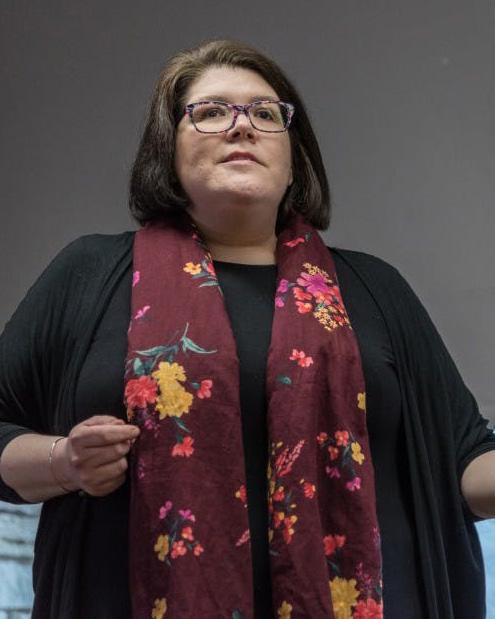
Martinez serves as CMU’s affirmative action and equal opportunity officer, as well as the Title IX coordinator. Title IX protects against sex discrimination in federally funded education programs, under amendments to the 1964 Civil Rights Act.
Before becoming executive director, Martinez worked as a Title IX investigator and served at the University of Toledo Offices of Student Conduct and Student Life, as well as in Michigan State University’s residence life department.
Martinez grew up in Wisconsin and pursued a Bachelor of the Arts degree in social work at MSU, and earned certif icates in diversity and gerontology. She graduated with her master’s in social work from MSU in 2009.
Central Michigan Life sat down with Martinez to discuss her work with Title IX and the changes and impact it has had across campus.
I started working in higher education and student affairs. So I was a hall director at two other universities, and then transitioned into being a director of student conduct. Back in 2012, when Title IX regulations really started changing at the federal level, I stepped into that position again at an other university, and as odd as it sounds, I have just thrived and loved doing the work.
Advocating for survivors and the underrepresented. ... I never know what my next phone call or email or incident report is going to be, and being a first-generation student, I really understand the struggle of finding your place at a uni versity. If a vulnerable incident happened, you might be at your lowest and you don’t know who to go to or who you can trust. So my passion, what keeps me going every day, are the students and the other employees that I help, even if it’s just by saying, ‘I’m here if you need something,’ helping someone find shelter or food or getting (them) out of a dangerous en vironment -- that’s really what I’m passionate about. I hear difficult stories, but at the end of the day, I’m grateful that I can be there for somebody.
What made you want to fulfill a position affiliated withOCRIE?
I sought out CMU. I wanted to be here. I’m originally from Wisconsin and lived in Ohio and Michigan, and (I was) looking with my family at where we wanted to be. CMU was the first public university in Michigan to have a stand-alone sexual misconduct policy. I mean, just thinking about that, we were the path leaders. That ... really drew me here. The dedication and the leadership of the univer sity saying we have a stand-alone policy about this, it is something that CMU is passionate about, the long history of student advocacy.
When I was looking for my next career move, I was very intentionally looking at things, and CMU really hit it all for me. I’m not here for the job, I’m here for the students and the school and the mission of the university.
Your previous position was as Title IX Investigator,what work were you doing in that role? What impact did that have on campus?
When a Title IX complaint came in, (I was) doing the fact finding and the fact gathering for the incident. ... It was really hands-on, kind of in-the-field, gathering all the facts, gath ering that information and weighing it all against each other to determine if someone violated the policy, and, if they did, what that discipline would look like.
Title IX has changed over recent years, and the federal law changed in 2020. ... We don’t make any pre-assumptions about anything, and also we empower individuals to advocate for themselves. When I’m thinking of working with a survi vor of any type of sexual misconduct — that could be sexual harassment, sexual assault, stalking, domestic violence [or] sexual exploitation — we need to understand the neurobiolo gy of trauma and how not every survivor is ready for the fight or ready at the same time to move forward. I think the culture at CMU is to give that time and space and understand that everybody processes their lived experiences in a different way, and we need to be ready to support them wherever they’re at throughout that process.
In the 50 years since Title IX was created, what has changed?
Oh, so much. In 1972, when Title IX was passed, it was really about giving women (equal) opportunity in sports and athlet ics. ... In just 50 short years — because it’s really not that long a time when you’re talking about higher education. Providing equity for all students is what got this started, and holding uni versities accountable if they were not treating women equally.
The Civil Rights Movements started this as we moved into looking at other forms of inequities. For example, some uni versities had what they called the women’s dorms and had a 10 p.m. curfew, when the men came and went as they pleased. Now, we have gender-inclusive housing where it doesn’t matter who you live with, you’re looking for a healthy roommate rela tionship, not for someone who biologically was born one way or another.
I also think we have a long way to go. Just because a law was passed 50 years ago doesn’t mean that it’s always being followed. We are continuously working to improve to have a better student experience for everyone and recognizing that hopefully in 20 years, that won’t be a conversation that we’re having.
Executive Director of Civil Rights and Institutional Equity, as well as Title IX coordinator Mary Martinez discusses her work with Title IX and the changes and impact it has had across campus.
In the next couple of weeks, if technology is in my favor, we’ll be launching our annual online training. All first-year students and new transfer students are required to take this online training about sexual misconduct. It really piggybacks on the “No Zebras, No Excuses” presentation that was given during the orientation program. (The presentation) talked about bystander intervention, how to help somebody if they need it and how to recognize signs of sexual harassment or potential dangerous situations. ... (In addition), reporting where you can go get help, different reporting options. My current goal is to just increase awareness about the rights of individuals when it comes to Title IX. (As well as) increase knowledge of this office and other support offices on campus. Why should others be mindful of Title IX?
I think it’s important for students to know that Title IX protects everybody, and it’s for everyone. It’s not a women’s issue, it’s not about women’s equity. It’s about gender equity and making sure that students know what their rights are and what their options are. ... Title IX is about providing those supports and resources and helping individuals get to a resolution.






Megan Varner, the director of Sexual Ag gression Peer Advocates (SAPA) at CMU Central Michigan University, has served in her current role since co-founder Brooke Oliver-Hempenstall left in early January of this year. She has been involved with SAPA since 2007. Prior to this, she served as the sexual aggression dedicated counselor and assistant director of SAPA, beginning in 2015.
Varner earned both her Bachelor of Science in family studies and Master of Arts in professional counseling from CMU. She was a peer advocate herself before becoming a graduate assistant with the program.
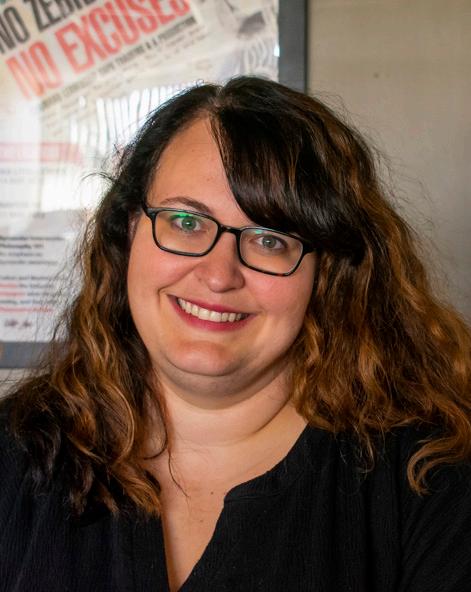
SAPA is a peer advocacy group and was established in 1996. It began with only 10 advocates and five contacts per school year before growing to around 50 advocates and over 300 contacts, according to the SAPA website.
Central Michigan Life sat down with Varner recently as part of its coverage commemorating the 50th anniversary of the passage of Title IX.
So we offer ... our (Crisis/Support Line), and then our (SAPA Chat Text), and those run 24/7. During the aca demic year, when classes are in session, we are operating. And then through those services, you can request to meet in-person with people.
SAPA’s can help bridge to other resources. They may be able to help fill out a personal protection order, or accom pany folks to the hospital or to the OCRIE (Office of Civil Rights and Institutional Equity) office, or to the police to file a report, to kind of be that additional support person and to advocate on behalf of the person that they’re work ing with. So they’re really there to support a survivor or someone who has been impacted however they need.
How have you worked to improve the advocacy services provided by SAPA, as well as in the com munity, to help foster better connections and unified survivor-centered approaches?
Going back to that text line I mentioned, we recognize the need that not all students or individuals impacted are going to be comfortable making a phone call and talking or meeting in-person. We want to be as available and as accessible as we can, no matter who you are and how you want to communicate with us. So I think that’s an example of how we are constantly thinking of how we can re-route and shift our services to meet the needs of the current climate and the folks that are there and to con stantly better our services.
In regards to the community, I think we are always looking for ways to connect. I know our office has been part of sexual assault response teams and community ventures to get folks together to discuss how we can better approach these issues as a community. We work as closely as we can with OCRIE and R.I.S.E Advocacy. We part ner with them as often as we can for awareness months. And I think the answer is anytime we can partner with somebody so that we can strengthen our message to the community, and so that we can reach more folks, we are open and willing to do that because it only betters us to have that reach to the community from other places.
October is Domestic Violence Awareness Month. What message do you want to send the CMU and Mount Pleasant communities during this time?
I think for me, one of the most important part of any awareness month is just that folks can gain a better understanding that this is something that impacts a lot of us, a lot of people in this world. There’s really no discrim ination based on a person’s gender or class or really any identifying factor. Domestic violence is across the board. I think even more importantly, what I love about aware ness months is that it is an opportunity for folks to band together and show their support and to show that they are there for people who have been directly impacted by domestic violence.
20 to 30 years ago these issues were not at the forefront of people’s attention. How has aware ness progressed? How has that impacted where we are today?
This is about my 15th year, so in my time ... CMU has really embraced those who have been impacted in such a great way. (Title IX has) always been a part of our Student Code of Conduct since I’ve been here. So even if there are changes to Title IX and the processes of how we approach investigations and reports and things like that, CMU has always made a clear statement that sexual assault and domestic violence on our campus is not acceptable and I will give CMU a lot of credit for that. I don’t know that that’s something that’s always been echoed across univer sities across the country, so at least for those of us that have participated in SAPA, and in this work, it’s always been a really nice point of pride in working at CMU. They really have embraced it in that way and not try to hide it. I think they’ve done a really good job in recognizing that it is something that impacts a lot of their students and community.
SAPA Director Megan Varner discusses resources program, offers importance of Title IX and how it impacts Central Michigan University
Brandon Horn ■ Staff ReporterAs a human being, I think Title IX really stretches beyond even just our world. I mean, if you look at the gender-based discrimination and the things it’s done for women’s athletics, and then even all the way to my world and the world of sexual violence and sexual harassment, it’s just really paved the way for a lot of forward move ment. That’s an impressive thing.
It doesn’t happen a lot in our society for something to stick around for this long and to make such a huge im pact and a ripple effect on all of those locations in all of those areas. From athletics to sexual aggression services, I mean, it’s amazing to me that this one seemingly small Title IX component has really impacted a community on this larger scale. So I think that’s really what it means to me – it’s just opened doors, paved the way for conver sations and made such a large impact on the lives of so many.
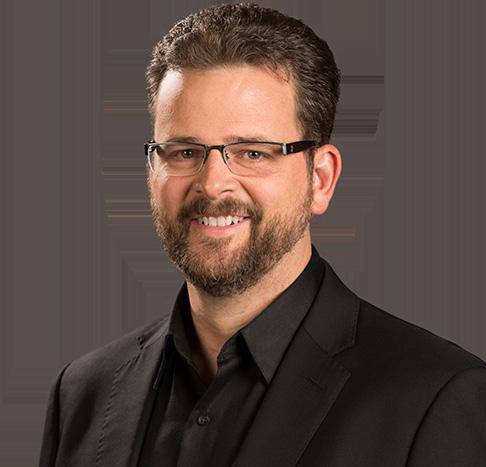





There is an ancient lie—a disturbing thread that ties our present to the distant past. What are the whispers that emerge from age-old tombs, speaking of things that move beyond the shadows? Are there dark influences and unspoken forces that have been quietly driving humanity from the very dawn of civilization . . . and if there are, where are they trying to take us?

The Secret of Room 217: It’s said to be one of the most haunted rooms in America. Some guests refuse to stay the entire night: after all, the nightmares within inspired one of the most infamous horror films of all time. What’s really going on behind the door of Room 217? A whole lot more than most people realize . . . and you’ll be surprised by where we have to go to find the answers.
Whisper of the Serpent: Ancient civilizations spoke of a shadowy underworld, a place completely unlike the world you inhabit. Who told them of such a place?






In the earliest years of the Christian church, there were voices professing to know something that nobody else knew. Where did they come from?



Edison invented something that few people ever talk about. Is it the key to unlocking
secrets of America’s most haunted room?
participating locations,





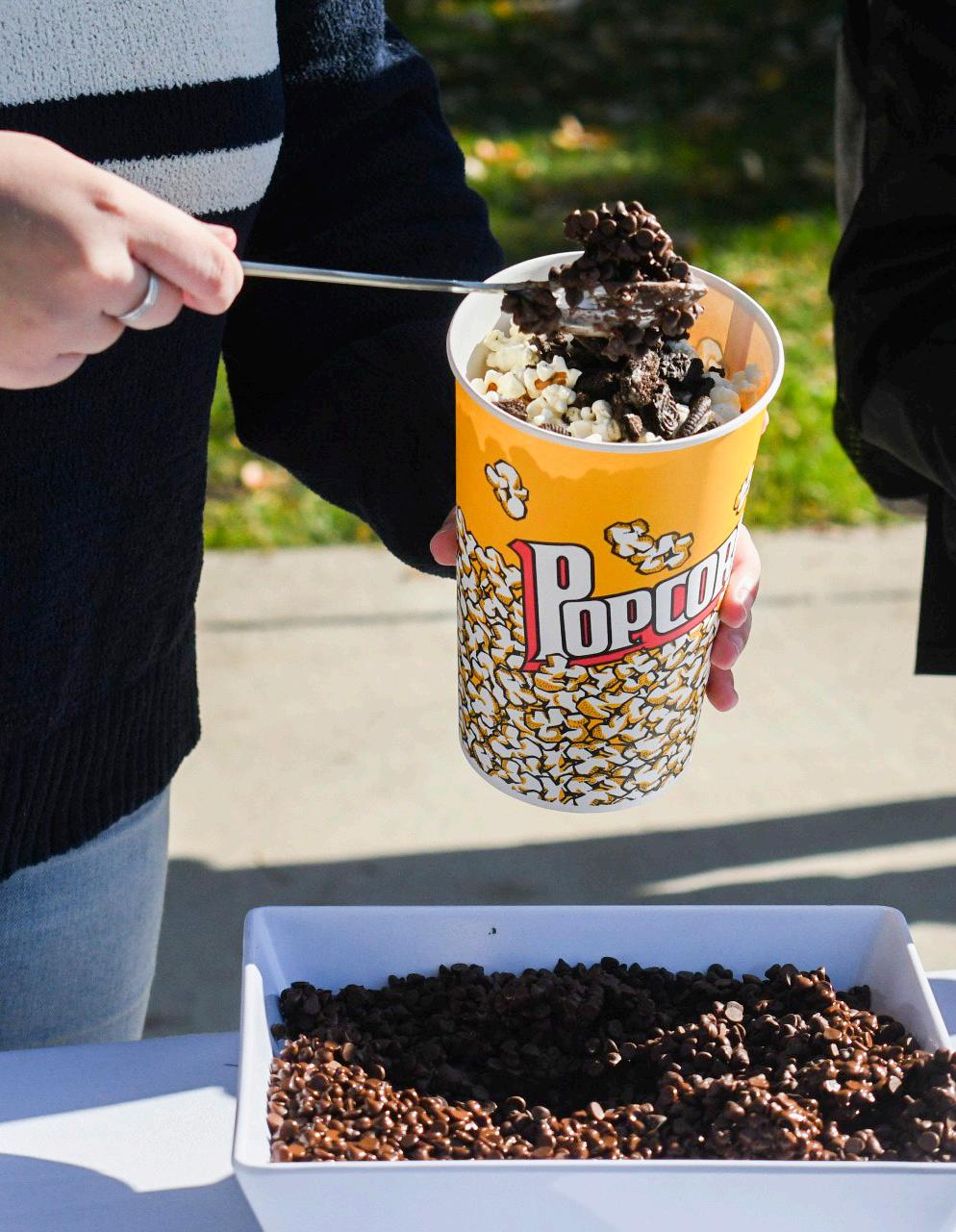


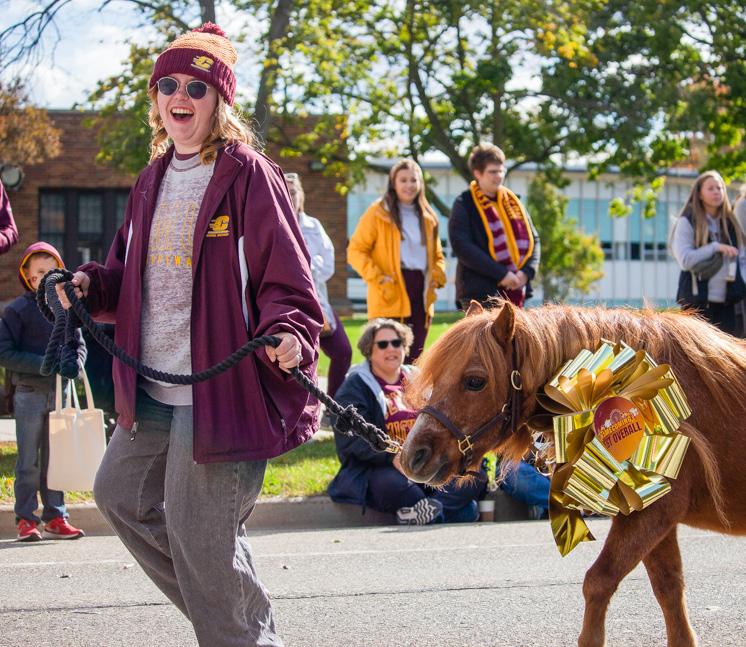
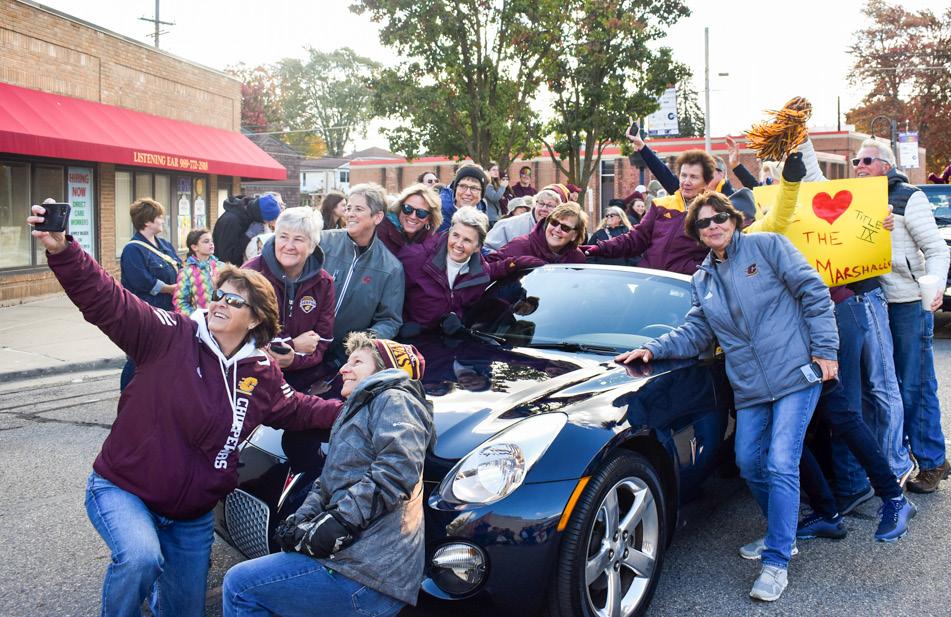
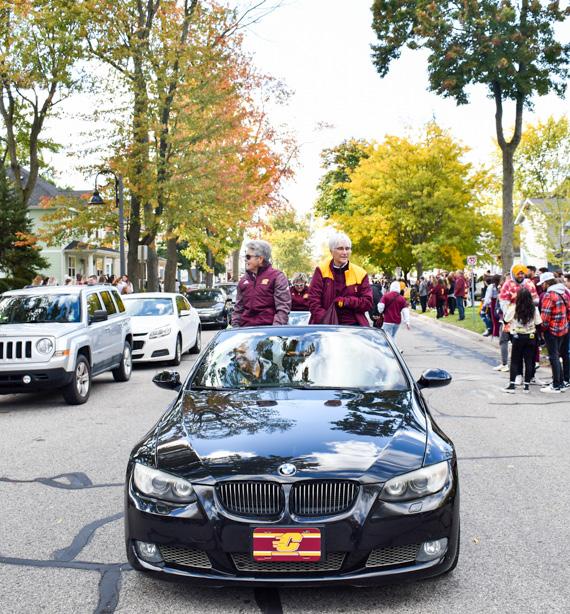

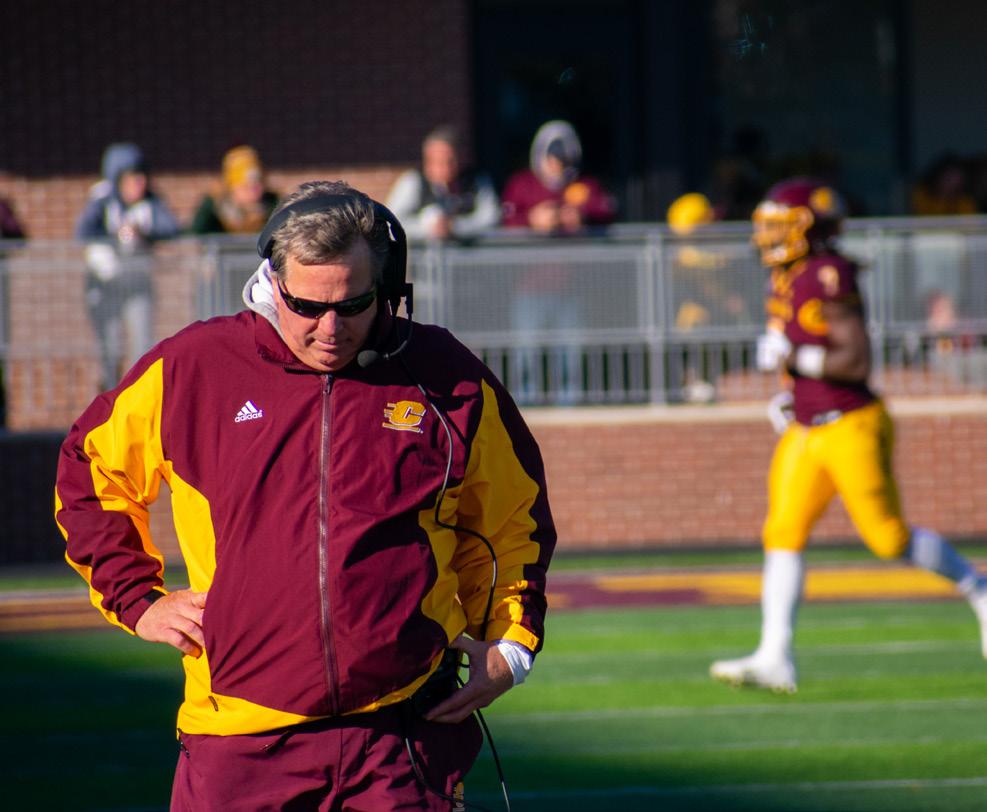
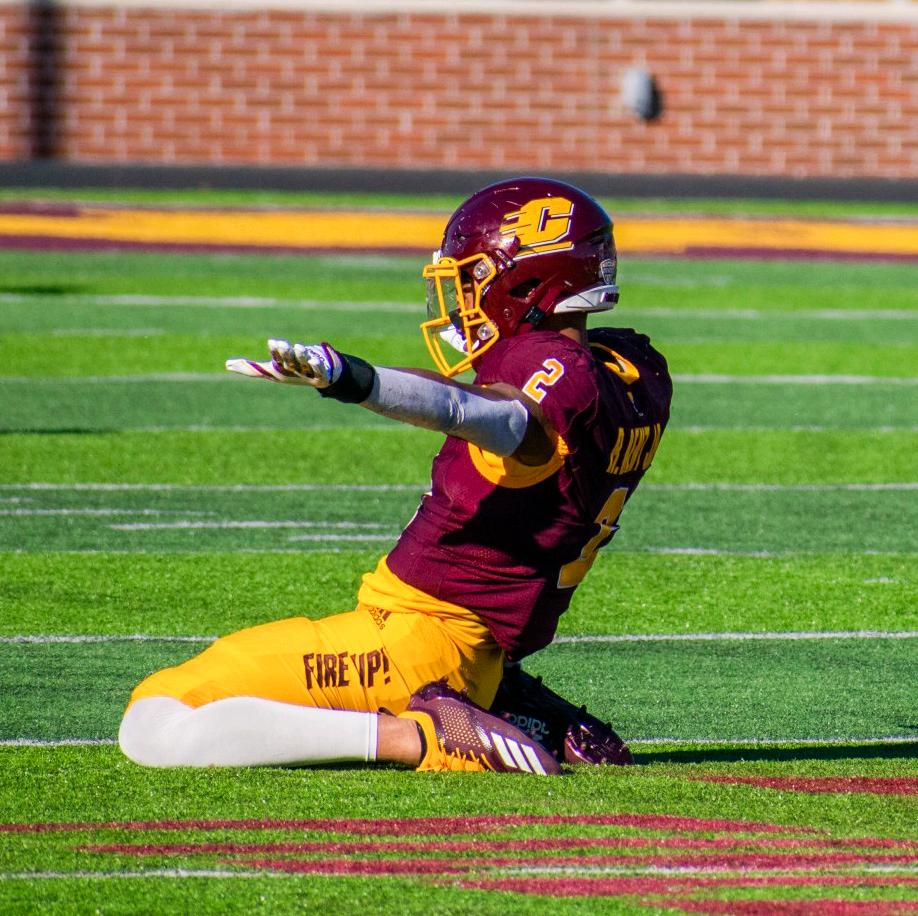

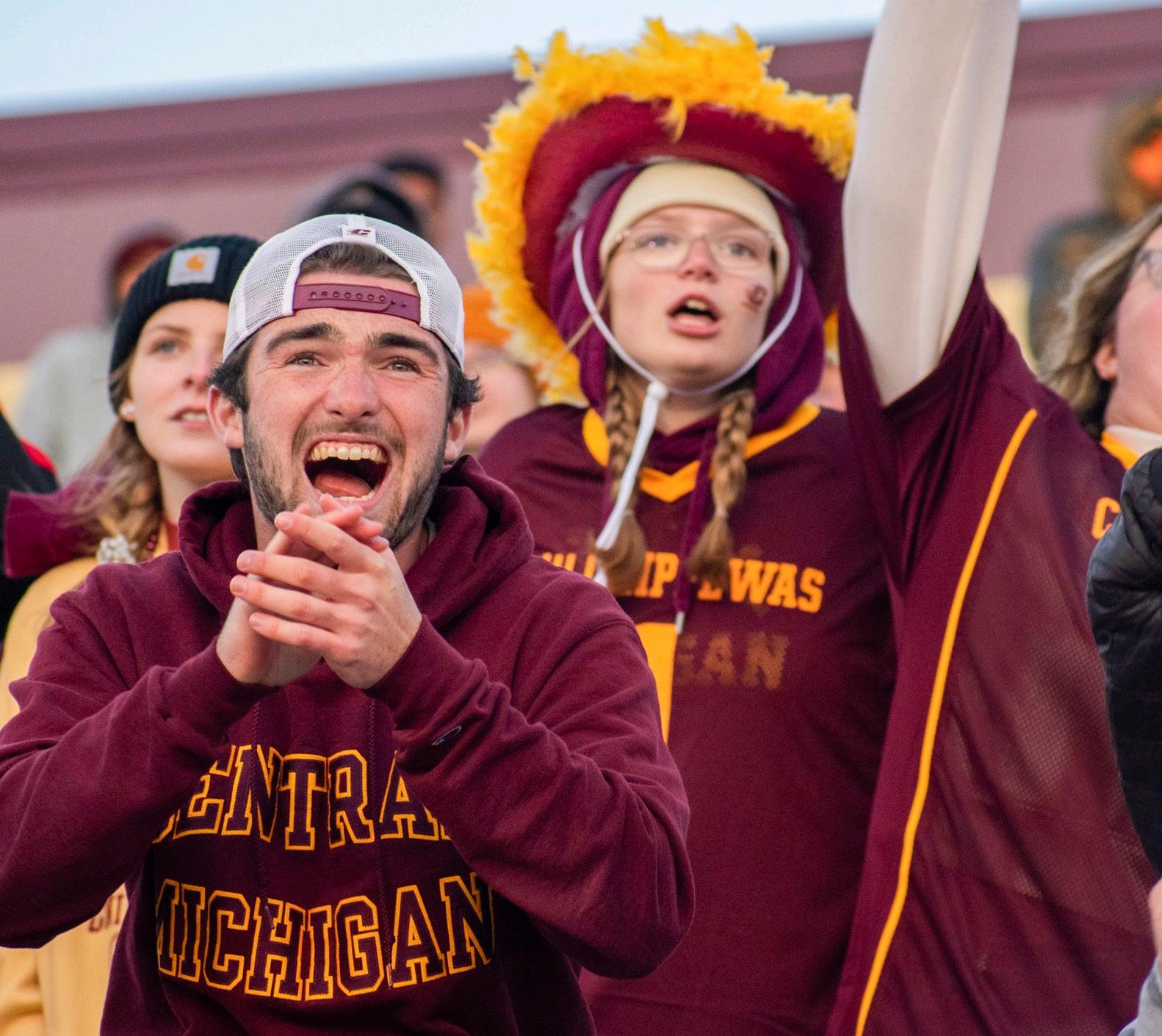
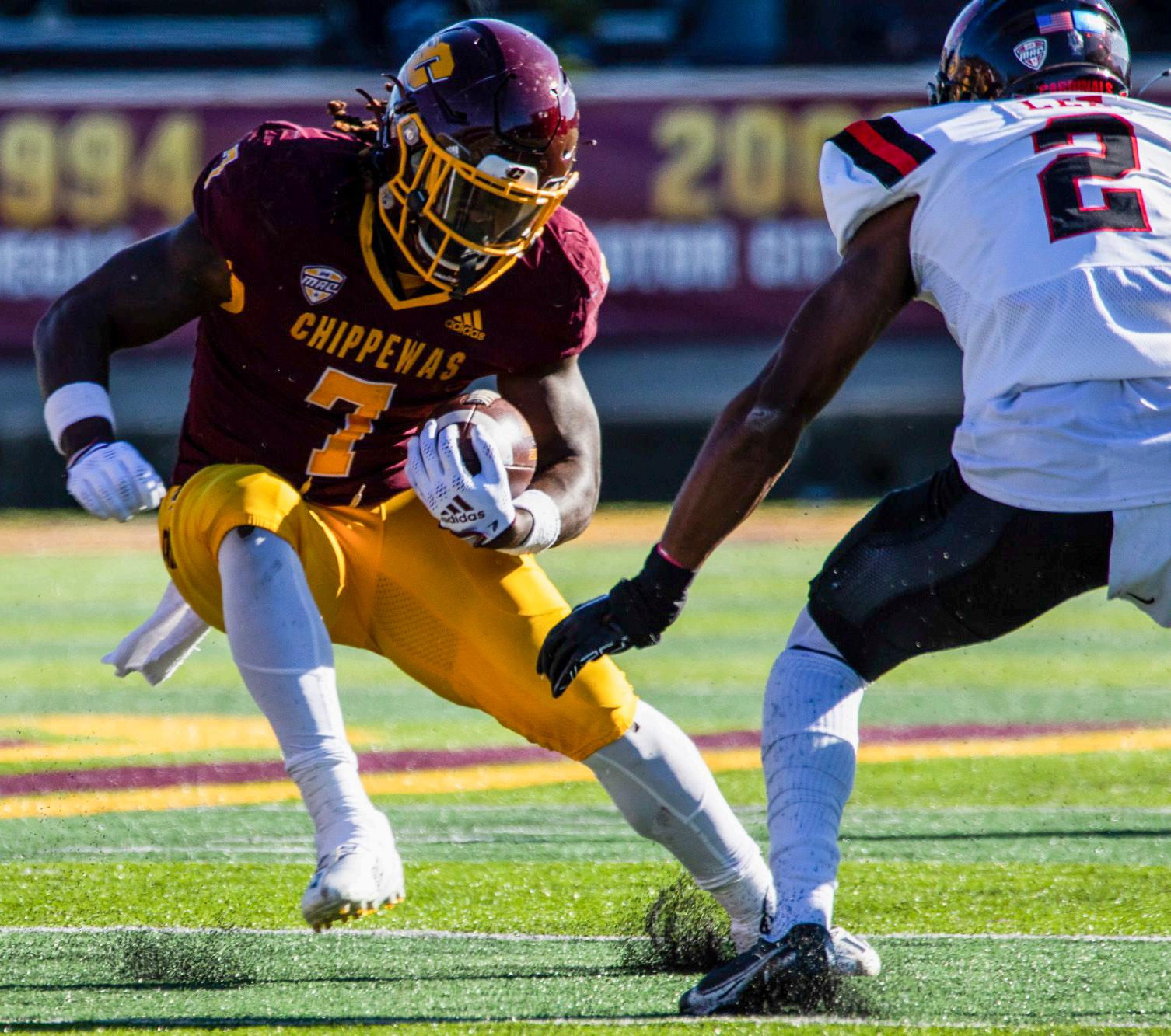
In recognition of Indigenous Peoples’ Day, Central Michigan University partnered with the Saginaw Chippewa Indian Tribe to host a tra ditional dance, mural dedication and keynote speaker.
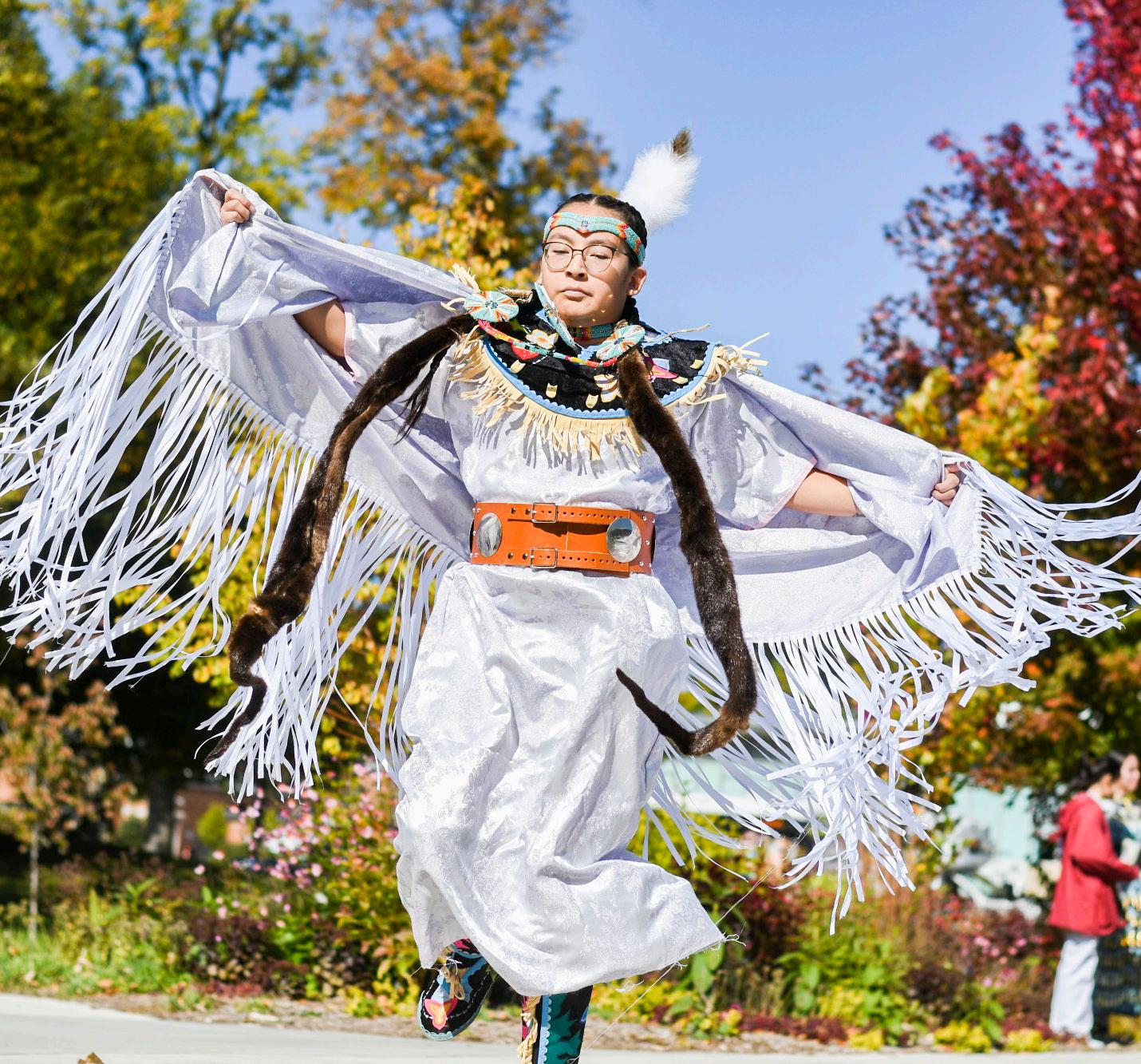
On Oct. 10 outside the Bovee University Center Rotunda, an unveiling was held for the mural created by artist Alan Compo on Indig enous Peoples’ Day and was accompanied by several speakers and a performance by Onion Creek, the Saginaw Chippewa Indian Tribe’s drum circle.
The mural’s unveiling comes down to a simple reminder about the Saginaw Chippewa
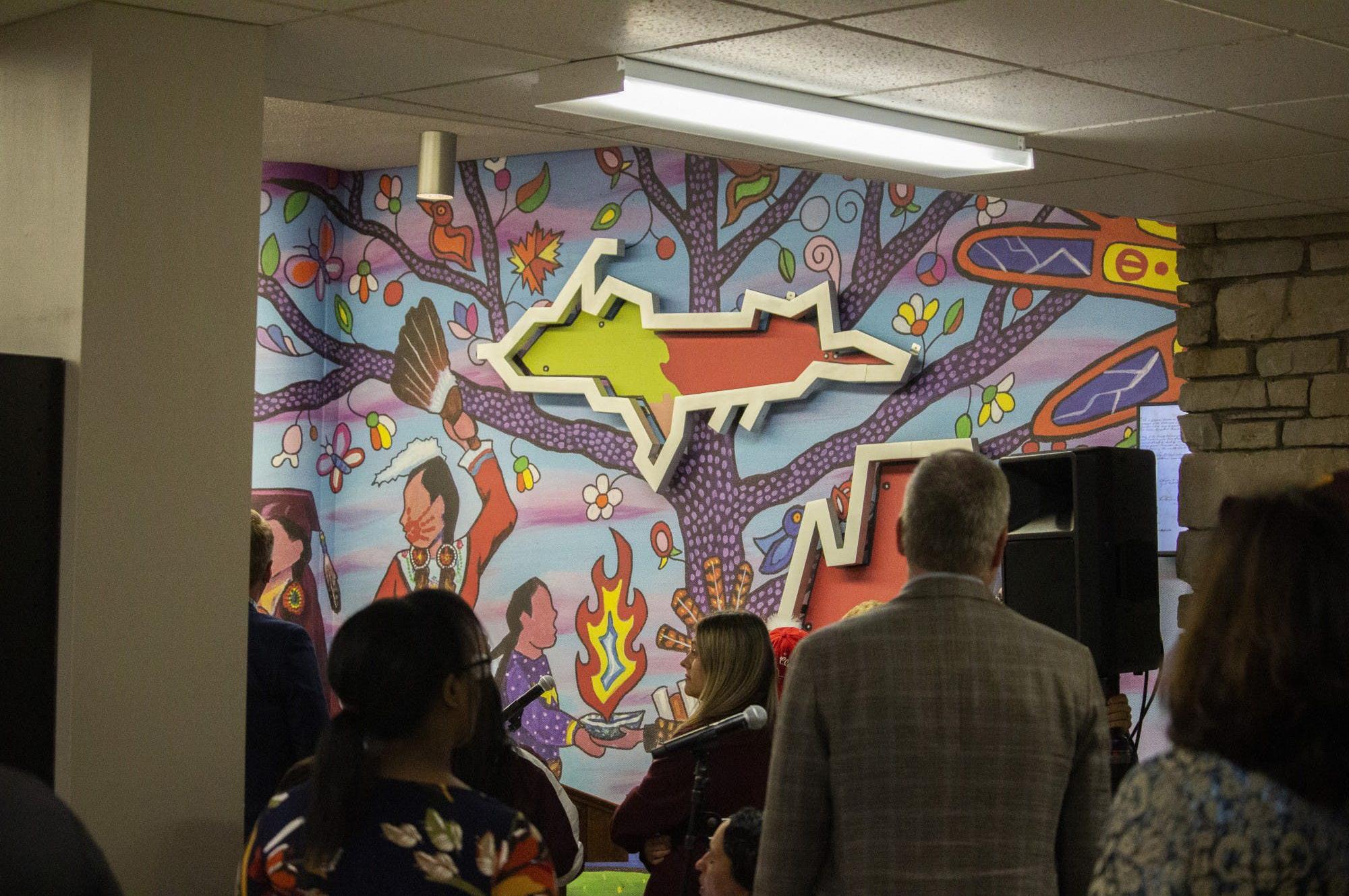
Indian Tribe for students and faculty alike.
“We are still here,” said the Director of Native American Programs Colleen Green. “We are resilient.”
As part of Central Michigan University’s Indigenous Peoples’ Day speaker series on Oct. 10, Shannon Bischoff, linguistics faculty mem ber at Purdue University Fort Wayne, spoke at the Sarah and Daniel Opperman Auditorium in the Park Library on indigenous language revitalization.
“The goal was specifically to civilize these in digenous people, and civilizing them meant get ting them to move into Western-style homes, getting them to adopt Western-style culture, and getting them to speak English, which in turn would destroy their culture,” Bischoff said.
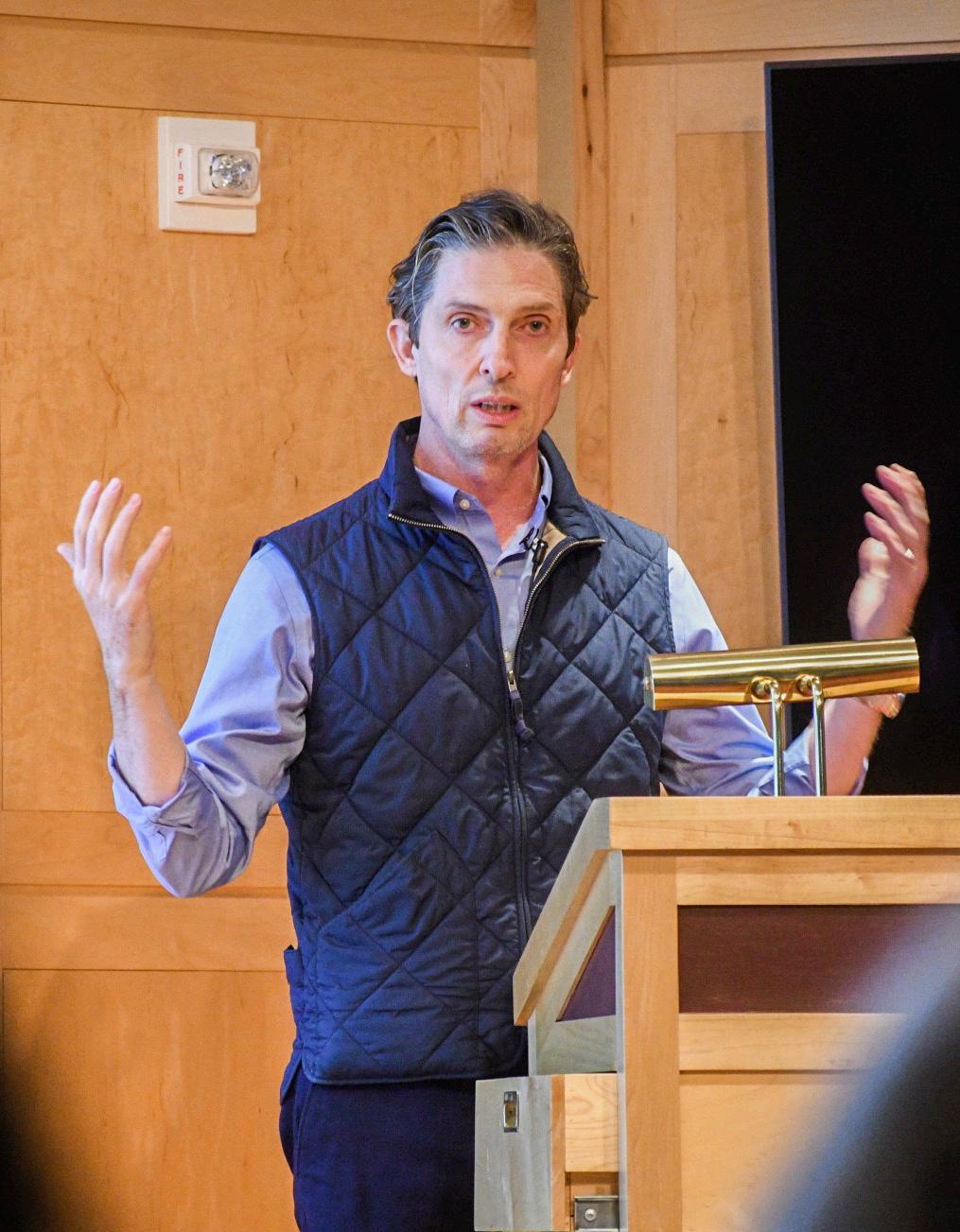
Spooky Structures: Build an edible haunted village
All day
Veterans Memorial Library.
*Online registration required
“The Keeper” Graphic novel memoir reading with Kelcey Ervick
p.m.
Bovee University Center Auditorium
*Open to the public
Black Business Panel for young women to receive advice
7:13 to 8 p.m. Anspach
*Open to Students
Spooky Candle Making 6 to 8 p.m.
Arts Sake
*All materials and instructions provided
Bonus Mushroom Hunt 10:30 a.m. to 1:30 p.m. Hall’s Lake Natural Area
*Open to the public
Supporting Trans and Non-Binary Stu dents, Faculty and Staff training
Noon to 1 p.m.
Center for Student Inclusion and Diversity in the UC
Saturday
Central Michigan Life, the in dependent voice of Central Michigan University, is edited and published by students of Central Michigan University every Thursday during the fall and spring semesters. The newspaper’s online edition, cm-life.com, contains all of the material published in print, and is updated on an as-needed basis.
Zonta Club’s 70th Anniversary 5 to 7 p.m. Art Reach
*Walk-in, no appointment needed
LGBTQ+ History Month: Pumpkin Paint ing
4 to 5 p.m.
Center for Student Inclusion and Diversity in Bovee University Center
*Open to students
Speaker Series: Veronica Roth
7 to 8:30 p.m. Plachta Auditorium
*Open to public
The Rocky Horror Picture Show
8 p.m.
Broadway Theatre
*Open to public
Optimist Club Creepy Carnival Halloween Bash
7 p.m. to Midnight Comfort Inn & Suites and Conference Center
*Tickets are $50 and reser vations are required (989) 772-4000.
4 to 6 p.m.
Downtown Mount Pleasant
*Open to public for trick or treating
Aural Rehab Workshop including communica tion strategies
9:30 to 11:30 a.m.
Carls Center for Clinical Care and Education in the Health Professions Building
*Open to students
Fall Craft Show
10 a.m.
Central Michigan Free Methodist Church
*Open to public
Mid-Michigan
5th Paranormal Convention
9 a.m. to 6 p.m.
Soaring Eagle Casino
*Open to public
11/7 Monday Kitty Fun Night
6:30 to 8 p.m.
Alan J. Stone Center for Recreation
*Open to public
Central Michigan Life serves the CMU and Mount Pleas ant communities, and is under the jurisdiction of the independent Student Media Board of Directors. Dave Clark serves as Director of Student Media at CMU and is the adviser to the newspaper.
Articles and opinions do not necessarily reflect the posi tion or opinions of Central Michigan University. Central Michigan Life is a member of the Associated Press, the Michigan Press Association, the Michigan Collegiate Press Association, the Associated Collegiate Press, College Newspaper Business & Ad vertising Managers Associa tion, the Mount Pleasant Area Chamber of Commerce, Cen tral Michigan Home Builders Association, Mount Pleasant Housing Association and the Mount Pleasant Downtown Business Association. The newspaper’s online provider is SN Works.
Central Michigan Life is distrib uted throughout the campus and at numerous locations throughout Mount Pleasant. Non-university subscriptions are $75 per academic year. Back copies are available at 50 cents per copy, or $1 if mailed. Photocopies of sto ries are 25 cents each. Digital copies of photographs pub lished in Central Michigan Life are available upon request at specified costs.
Central Michigan Life’s edito rial and business offices are located at 436 Moore Hall, Central Michigan University, Mount Pleasant, MI 48859, telephone (989) 774-3493 or 774-LIFE.

If you’ve read this far, you know all about the decorated women legends that have graced Central Michigan Universi ty’s campus for the past several decades. The ability of women in sports today at this university is largely thanks to the six women represented at CMU’s homecoming last week as grand marshals.
Central Michigan Life’s cover story gives a lengthy explanation of how their legacy started and carried them to the present day. But one part of the conversation that can not be left out of is the ever-present need for progress.
Title IX is great. In 1972, it provided women student-athletes equal treatment under the law, and since then has added protec tion from sex-based harassment and sexual violence. But it’s been 50 years. And student athletes need more.
On the day of the anniversary - June 23 - the U.S. Department of Education (DOE) opened a public comment for proposed changes to Title IX that would broaden the definition of sexbased harassment and discrimination to include gender identity and sexual orientation.
According to Education Week, 235,816 responses were re ceived as of the Sept. 12 deadline.
Responses detailed reasons in favor of and against the pro posal. The answers highlight an enormous variety of opinions on this matter.
“I plead with you to update the current definition of sexual harassment that is found in the 2020 Title IX regulation to not force the Alt-Right Conservative Religious agenda on the chil dren of this nation,” one comment in favor of the revisions said.
“In the 701 pages, the Department of Education appears to be undermining the family and inflicting harm to girls. Further defining discrimination should be a matter for the legislature and the courts to determine. Re-writing the rules to conform to a political agenda is not the purpose of the Executive Branch of government,” a comment against the proposal said.
The effort to update the regulations originally began in March.
According to the DOE, the proposed regulations would:
• Clearly protect students and employees from all forms of sex discrimination.
• Provide full protection from sex-based harassment.
• Protect the right of parents and guardians to support their elementary and secondary school children.
• Require schools to take prompt and effective action to end any sex discrimination in their education programs or activities – and to prevent its recurrence and remedy its effects.
• Protect students and employees who are pregnant or have pregnancy-related conditions.
• Require schools to provide supportive measures to stu dents and employees affected by conduct that may constitute sex discrimination, including students who have brought complaints or been accused of sex-based harassment.
• Require schools to provide supportive measures to stu dents and employees affected by conduct that may constitute sex
Buick LaCrosse; John Deere X730 Lawn Tractor; Bombardier Traxter Max atv; WWll firearms, more! Live Auction Sat., Oct. 22, 2022, 10:00 a.m. 12521 Baker Rd. Frankenmuth, MI. Details at: Bid. SherwoodAuctionServicellc.com
discrimination, including students who have brought complaints or been accused of sex-based harassment.
• Protect LGBTQI+ students from discrimination based on sexual orientation, gender identity and sex characteristics.
• Clarify and confirm protection from retaliation for stu dents, employees and others who exercise their Title IX rights.
• Improve the adaptability of the regulations’ grievance procedure requirements so that all recipients can implement Title IX’s promise of nondiscrimination fully and fairly in their educational environments.
• Ensure that schools share their nondiscrimination policies with all students, employees and other participants in their education programs or activities.
U.S. President Joe Biden also vowed to do more work to pro tect all people from discrimination in athletics, not just women.
“I am committed to protecting this progress and working to achieve full equality, inclusion, and dignity for women and girls, LGBTQI+ Americans, all students and all Americans,” a written statement from Biden said.
CMU has come a long way in 50 years. But there’s more work to be done for all identities on campus. With the six grand marshals, among many leaders, trailblazing a path to equality, it will take intention and motivation from everyone to make sure change happens.
Like these ladies did in their respective sports, let’s work to gether to make this an equitable campus and more importantly, home, to all students.
BATH & SHOWER UPDATES in as little as ONE DAY! Affordable prices - No payments for 18 months! Lifetime warranty & professional installs. Senior & Military Discounts available. Call: 877-401-2404
Safe Step. North America’s #1 Walk-In Tub. Comprehensive lifetime warranty. Top-of-the-line installation and service. Now featuring our FREE showerpackage and $1600 Off for alimited time! Call today! Financingavailable. Call Safe Step 1-866-3191374
Shippingavailable. Conducting successful statewide auctions year-round since 1979. Interested in selling?
Adjustable Bed Brand New with Imcomfort gel memory foam mattress. Retail Cost $3,995.00, sacrifice for $875.00. Call for showing or delivery: 989-615-2951.
Two 2-bedroom units available on attractively
E. Wing Rd. Mount Pleasant, MI. Appliances (washer,
Multiple Online Estate Auctions
Prepare for power outages today with a GENERAC home standby generator $0 Money Down + Low Monthly Payment Options. Request a FREE Quote Call now before the next power outage: 1-855-922-0420
POLE BARNS BUILT BEST BARNS Best Quality,Best Service, NOW IN OUR 25TH YEAR! OVER 4,000 BUILDINGS IN MID MICHIGAN. Call for QUOTES. License/Insured 989-205-2534
Eliminate gutter cleaning forever!LeafFilter, the most advanced debrisblocking gutter protection. Schedule a FREE LeafFilter estimate today.15% off Entire Purchase. 10% Senior & Military Discounts. Call 1-844-369-2501
American Standard Walk-In Tubs. Buy from a brand you trust. Patented QuickDrain® technology. 44 hydrotherapy jets. Lifetime warranty on tub and installation! FREE in-home consultation at your convenience. Limited time offer - $1,500 in savings includes a FREE right-height toilet. Call 1-833-591-1961
Trouble hearing your TV? Try TV EARS’s Voice Clarifying Wireless TV Speaker. Better than a soundbar and/or turning the TV volume way up. Special, limited time $50 off offer. Call TV Ears. Use code MBSP50. Call 1-844-532-0612
DIRECTV for $79.99/mo for 12 months with CHOICE Package. Watch your favorite live sports, news & entertainment anywhere.First 3 months of HBO Max, Cinemax, Showtime, Starz and Epixincluded! Directv is #1 in Customer Satisfaction (JD Power & Assoc.) Some restrictions apply. Call 1-888351-0154
AMISH LOG HEADBOARD AND Queen Pillow Top Mattress Set.
new-never used,
for
The Generac PWRcell, a solar plus battery storage system. SAVE money, reduce your reliance on the grid, prepare for power outages and power your home. Full installationservices available. $0 Down Financing Option. Request a FREE,no obligation, quote today. Call 1-855-476-9698 DISH Network. $64.99 for 190 Channels! Blazing Fast Internet,$19.99/mo. (where available.)Switch & Get a FREE $100 Visa Gift Card. FREE Voice Remote. FREE HD DVR. FREE Streaming on ALLDevices. Call today! 1-866-9506757
Title IX is great, but there’s lots more work to do




